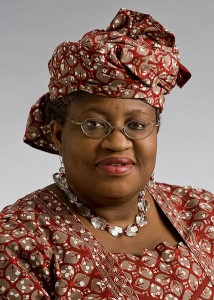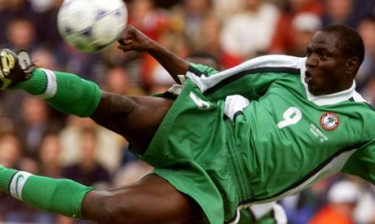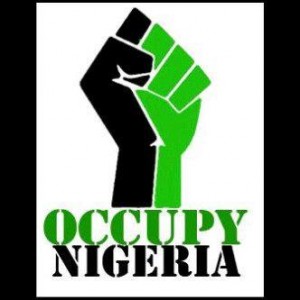“Africa's most populous country and it's brightest hope. Nigeria is an odd place to find a silver lining. In spite of its all-too-visible failings, I believe that Nigeria's mix of talent, resources, and gall will one day pull the country up out of Africa's Nth World.”
- Blaine Harden, “Africa: Dispatches from a Fragile Continent”.
2012 was a curious mix of tensions, anguish and hope for Nigeria. The blogosphere never had an idle moment. We present our picture of Nigeria, from an amalgamation of some of the stories that made news on Global Voices in 2012. These narrations represent a country, where challenges arise continuously but also unceasingly emits hope.
Citizen media and activism
Early in January 2012, Nigeria got the world's attention with a presidential announcement that withdrew the subsidy on fuel. Trade unions and civil society organizations responded with #OccupyNigeria protests. For days, the nation was shut down: no one worked, earned or learned. Of particular interest was the galvanisation of cyberspace with face-to-face protests. This synergy between online and real time protest was articulated by African Urbanism:
Occupy Nigeria Logo (Courtsey: Nigerianstalk.com)
As a lover of communications, media and especially social media, there are two things about this movement that make me especially excited: 1) First, the impressive role that social media is playing in terms of documenting and for coordinating activities and 2) the astounding amount of people that are making use of this medium to make their voiced heard… “Follow#occupynigeria #fuelsubsidyfor just a couple minutes and you'll see precisely what I'm talking about — in a highly mobile country of more than 150 million, tweets are coming in so fast at times it’s almost impossible to keep up with the conversation.
In July, we reported the reaction of netizens to the call of the Nigerian Senate President – a move he later denied – to clamp down on social media. This news ignited the blogosphere and was perceived as a declaration of war by netizens:
Digital natives also amplified the voices of offline victims who were displaced from their slum homes in Makoko, Lagos.
@chineduozordi: After her shanty in Makoko was demolished by the government, Janet and her 3 kids simply moved into their canoe ensconced under the 3MB (Third Mainland Bridge).
Twitter users were disgusted not because a slum was demolished but how the way it was done. Apparently, the victims were not given enough time to find alternatives.
@tejucole: The living conditions in Makoko were appalling, but appalling, too, is waking up to guns, bulldozers, violence, and sudden homelessness.
We introduced you to Battabox - a Nigerian Conversation – which engages real life stories from the street, weaves a narration and presents it to a global audience through online videos. Here is an interview with Christian Purefoy of Battabox with our author, Nwachukwu Egbunike.
The mob justice meted on the “Aluu4″ was a rather horrid and horrifying low point for Nigerians. Julie Owono discusses the incident and its aftermath in this post – “A Legal Solution to Mob Justice in Nigeria”.
Nigerian Bloggers and Tweeps Saved #Oke was one of the greatest manifestations of hope that emanated from the Nigerian blogosphere in 2012. Oke, a young Nigerian almost lost his foot to diabetes if not for a campaign that was facilitated by netizens. He was flown to India where he got medical attention. This story is a part of the Global Voices eBook: African Voices of Hope and Change.
In Lessons from the #SaveOke Campaign Fairy GodSister’s highlights four components:
Social Media is Powerful
I’ve never doubted the power of social media (wouldn’t have studied it if I did) but if I did, this campaign would have forever put paid to those doubts. The speed with which the blog posts spread and the amazing functionality called the ‘retweet’.
Nigeria is in Trouble
Oke’s story was just another instance pointing to a problem we (Nigeria) haven’t gotten past. Unfortunately, even in 2012 we are still in the ‘reaction’ rather than ‘proactive’ mode. No one thinks to plan for the future, hell we’re barely getting through today!
Who Sings for the Unsung?
How many people die every day because they have no access to qualitative healthcare? How many ‘trivial’ cases transform into life threatening because they were not nipped in the bud with adequate treatment? Who sings for the unsung?
We are still the World
Social media has always and will always revolve around people. Social media without human involvement can be compared to a beautiful car without a driver: it is nothing without our input. It is one thing to sit in the comfort of your home and moan every day about everything going wrong with the country, how the government doesn’t care, how we need a ‘paradigm shift (lol), etc. It is a totally different (and more profitable) thing however to do your civic duties, know your leaders (local and national), and then hold them accountable by getting informed, asking them questions, you know the drill.
Politics, Diplomacy and Arts

Ngozi Okonjo-Iweala, Nigeria’s Finance and Co-ordinating Minister of the Economy. Image released in the public domain by www.imf.org/
Ngozi Okonjo Iwealla’s (NOI) bid for the World Bank Presidency generated global ripples online and offline. She was also grateful for the support from other African countries. NOI’s Facebook post stated as follows:
I am honoured by my nomination and the support of multiple African Nations to make the World Bank more representative of the people it serves. As an employee of the Bank for 22 years, I know of its commitment to improving the lives of those in developing world. It is that passion that inspires me to do the most I can for Nigeria as the Minister of Finance.
Although the Nigeria’s Finance Minister lost the bid to the US favourite, she was seen as the best candidate. And this was obvious with netizens continued talking even after the selection. On her Facebook page, Ngozi congratulated the new World Bank president and adds:
With regard to the selection process, it is clear to me that we need to make it more open, transparent and merit-based. We need to make sure that we do not contribute to a democratic deficit in global governance.
Nevertheless, by our participation we have won important victories. We have shown what is possible. Our credible and merit-based challenge to a long-standing and unfair tradition will ensure that the process of choosing a World Bank president will never be the same again. The struggle for greater equity and fairness has reached a critical point and the hands of the clock cannot be turned back.
Nigeria-China relations were a mix bag. In July, Oiwan Lam, reported protests that were triggered because of the suspicious death of a Nigerian in Guangzhou's Sanyuanli District while in police custody. In September, the Lagos State Government introduced Mandarin in public schools.
Zuma Rock, in Abuja – capital city of Nigeria – was one of the contestants in the voting for One of the Seven Wonders of Africa. Similarly, two Nigerian writers – Chinua Achebe and Wole Soyinka – were among the list of contenders for the 10 Most Influential African Thinkers Alive.
The Osun Osogbo Sacred Groove – a UNESCO designated cultural site – made a comeback to the global scene through a documentary. The producer, Immanuel Afolabi spoke to Nwachukwu Egbunike – among other things – about digitalizing Africa's spiritual experience.
Sports
Richard Wanjohi chronicled the buzz generated by the death of Rashidi Yekini (1963-2012) – one of Africa’s highest scoring heroes in football.

Rashidi Yekini – Nigeria's soccer legend. Photo source goal.com.
The North Bank Evening Standard from Gambia also shared highlights of his career:
Yekini scored nearly 40 goals as a Nigerian international, and represented the nation in five major tournaments, including 2 World Cups, where he scored the country’s first-ever goal in the competition. He was also named the African Footballer of the Year once
The William Sisters, Serena and Venus, were in Nigeria between October 30 to November 2, 2012. In this post we presented the rousing welcome they received in Lagos.







